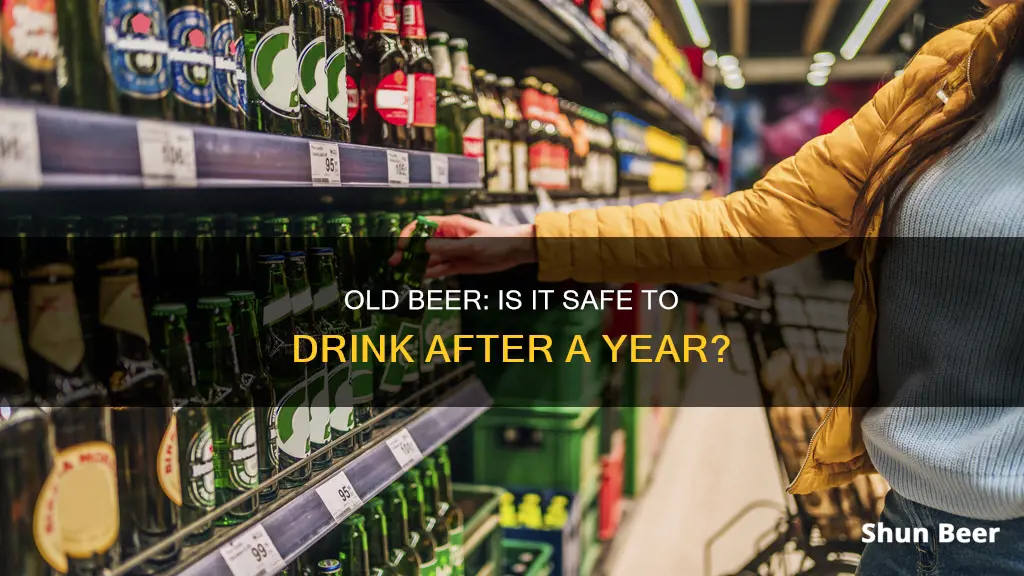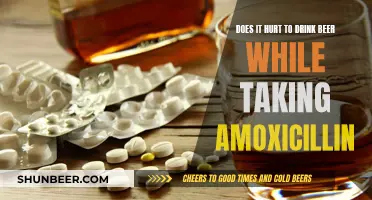
Beer is a beloved beverage for many, but what happens when it sits in your fridge or pantry for a year? Can you still drink it? The short answer is yes, you likely can. Unlike milk, old beer won't make you sick, but that doesn't mean it will taste good. The longer beer is stored, the more its flavour degrades, and the more likely you will experience unpleasant tastes and aromas. However, this doesn't happen overnight, and beer can last for years beyond its expiration date, especially if stored in a cool, dark place.
Can You Drink 1-Year-Old Beer?
| Characteristics | Values |
|---|---|
| Is it safe to drink? | Yes, it is safe to drink 1-year-old beer. Beer doesn't "expire" in the traditional sense. |
| Will it taste good? | Probably not. Beer is best consumed fresh, within 3-6 months of purchase. |
| How to store it? | Store beer in a cool, dark place, away from temperature fluctuations. Keep it upright to minimize oxidation. |
| What if it's opened? | Opened beer has a shelf life of about a day, regardless of the expiration date. |
| What if it's canned/bottled? | Canned beer is better protected from light than bottled beer. Brown bottles are better than green or clear glass bottles. |
| What if it's a high ABV beer? | Higher ABV beers tend to last longer than lighter beers. |
What You'll Learn

Beer doesn't expire in a way that will make you sick, but it can taste bad
Beer is a beloved beverage for many, but what happens if you find a long-lost can at the back of the fridge or tucked away in the pantry? Can you still drink it?
The short answer is yes, you can safely drink beer past its drink-by date. Beer doesn't expire in a way that will make you sick. The fermentation process used in brewing, along with its low pH and alcohol content, creates an unfriendly environment for microorganisms. So, even if a beer sits on the shelf for years, as long as it's sealed, it's unlikely to cause any health issues.
However, the taste of beer can change over time. The delicate characteristics of beer, such as the wonderful hoppy aroma of an IPA, can dissipate within a few months. The volatile aromas that give beer its unique characteristics tend to fade, and oxidation can set in, resulting in cardboard-like aftertastes or even a skunky flavour.
To keep your beer tasting its best, it's important to store it properly. Keep it in a cool, dark place, preferably the refrigerator. If stored at room temperature, ensure it's away from direct sunlight. Beer should also be kept upright to minimize contact with oxygen, and it's best to enjoy it as fresh as possible.
So, while you may not get sick from drinking old beer, it might not taste as good as a fresh brew. Cheers to that!
Beer and Zantac: Is It Safe to Mix?
You may want to see also

Beer is best stored in a cool, dark place
If you don't have a way to measure the temperature, you can store unopened beer in the fridge, where it will remain at optimal quality for up to eight months. Beer can also be stored at room temperature, where it will stay at the best quality for up to six months.
However, storing beer in the refrigerator or at room temperature will not prolong its life indefinitely. Beer will eventually go bad, and its flavour will degrade over time. In addition, once a beer is opened, it will only remain fresh for about a day, even if it is refrigerated.
To further prolong the shelf life of beer, it is recommended to store it upright to minimise oxidation and avoid exposing it to direct sunlight. UV rays can cause beer to lose its flavour and develop a foul taste, which is why beer bottles are often made of dark-coloured glass.
Drinking Beer After Dental Work: What You Need to Know
You may want to see also

Beer is affected by light, oxygen, heat, and time
Light
Light exposure, especially UV rays, can cause beer to develop a foul taste and smell. This is due to a chemical reaction between the light and the hops in the beer, which produces an odour and taste similar to skunk spray. This is why many beers are packaged in brown bottles, as brown glass absorbs the blue, purple, and green wavelengths that cause this reaction. Clear, green, and blue glass allow these wavelengths to enter the beer, increasing the likelihood of skunkiness.
Incandescent and halogen lights are less likely to cause skunkiness than sunlight, as they emit longer wavelengths of light that do not cause this reaction. However, LED and fluorescent lights emit more specific wavelengths that are more likely to cause skunkiness.
Oxygen
Oxygen is another factor that can affect beer. Once a beer is opened, it begins to oxidise, and the flavours may change. Re-sealing can slow this process, but opened beer is best consumed within a day or two for optimal taste.
Heat
Heat can cause beer to go bad more quickly. As a general rule, beer can be kept at 90°F for only 3 days before it goes bad. It will last 30 days at 72°F, and up to 300 days at 38°F. Therefore, it is important to store beer at the proper temperature to prevent it from going bad.
Time
Beer does expire and its flavour and quality will degrade over time. However, this does not mean that expired beer becomes unsafe to drink. Drinking expired beer will not make you sick, but you may experience unpleasant tastes and aromas. Beer that is past its expiration date may have a flat taste and lose its flavour. The higher the alcohol content of the beer, the less concerned you need to be with the expiration date.
Drinking Beer in Public: France's Laws Explained
You may want to see also

Beer stored in a refrigerator can last two to three years
Beer is an alcoholic beverage that can be stored and preserved for consumption over a long period. One of the critical factors in ensuring beer's longevity is proper storage, especially when it comes to temperature and light exposure. Beer stored in a refrigerator can last for an extended period, even beyond its expiration date.
The shelf life of beer varies depending on several factors, including the type of beer, packaging, and storage conditions. Generally, beer has a shelf life of about 5 to 9 months beyond the expiration date if stored at room temperature. However, when stored in a refrigerator, the shelf life of beer can be significantly extended. Beer stored in a refrigerator, whether bottled, canned, or in a growler, can last for up to an additional 2 to 3 years beyond its expiration date. This extended shelf life is applicable to unopened beer, as opened beer has a much shorter shelf life of about a day, even when refrigerated.
The longevity of beer in a refrigerator is due to the reduced temperature slowing down the chemical reactions that cause spoilage. Additionally, refrigeration helps prevent exposure to sunlight, which can cause a chemical reaction in the beer, resulting in an unpleasant taste and odour.
It is important to note that while refrigeration can extend the shelf life of beer, it does not indefinitely preserve it. Beer can still go bad during refrigeration, and its quality will gradually decline over time. Therefore, it is recommended to consume beer within 3 to 6 months of the expiration date, even when stored in a refrigerator, to ensure optimal taste and quality.
In summary, proper storage plays a crucial role in preserving the quality and freshness of beer. By storing beer in a refrigerator, you can extend its shelf life by up to 2 to 3 years beyond the expiration date. However, it is essential to prioritize consumption within a reasonable timeframe to enjoy the beer at its best.
Beer and Bipolar Disorder: What's the Connection?
You may want to see also

Beer stored at room temperature should be consumed within four to six months
Beer is a delicate beverage, and its enemies are light, oxygen, heat, and time. While beer doesn't expire in the same way that food does, it certainly has a shelf life. The longer beer is stored, the more its flavour will degrade. Beer stored at room temperature should be consumed within four to six months.
The reason beer is so sensitive to its environment is that its four main ingredients – water, hops, yeast, and malt – are all affected by light, oxygen, heat, and time. Hops, in particular, are sensitive to UV radiation from the sun, which is why beer bottles tend to be tinted brown. Even an hour of exposure to sunlight can cause a chemical reaction that produces 3-methyl crotyl mercaptan, a compound that smells and tastes like skunk.
Oxygen is another culprit. Although brewers use advanced techniques to limit the amount of oxygen in a can or bottle of beer, a small amount will always get in. This causes oxidation, which results in a papery or cardboard-like taste. Once a bottle or can of beer is opened, oxidation speeds up, and the beverage will be noticeably less flavoursome if left out for too long.
Heat speeds up oxidation, so it's best to store beer in a refrigerator. Major changes in temperature – such as moving a beer from a cooler to a hot car – can also negatively affect the flavour, and this process is irreversible.
Although light doesn't "age" beer, it can trigger a chemical reaction in certain hop compounds, resulting in that all-too-familiar skunky flavour. Hop compounds are especially sensitive to light and can become "light struck". Beer bottles tend to be brown, which offers some protection against UV light, but aluminium cans are even better at blocking out UV rays.
While drinking a one-year-old beer won't make you sick, the flavour will likely have degraded, especially if the beer was stored at room temperature. So, if you have a beer that's approaching its one-year birthday, crack it open and give it a taste. It might not be as refreshing as you remember.
Coffee and Beer: A Match Made in Heaven?
You may want to see also
Frequently asked questions
Yes, drinking 1-year-old beer is safe. Beer doesn't expire in the same way as milk, and even if it's sealed for years, it's unlikely to make you sick.
If your beer has lost its fizz, or has a vinegary taste, it's gone bad. You may also notice a skunky smell or taste, caused by exposure to UV light.
Store beer in a cool, dark place, away from temperature fluctuations. Keep it upright to minimise oxidation, and if possible, store it in the refrigerator.
Yes, the type of beer affects its shelf life. Stronger beers, such as stouts and porters, tend to last longer than lighter beers like lagers and pilsners.







